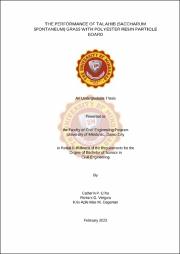The performance of talahib (saccharum spontaneum) grass with polyester resin particle

View/
Date
2023-02Author
Cifra, Catherin P.
Vergara, Romarc G.
Daguman, Kris Aple Mae M.
Citation Tool
Metadata
Show full item recordAbstract
This research evaluated the performance of a particle board made from talahib grass (Saccharum spontaneum) and polyester resin as a binding agent. Following the guidelines established by the American Society for Testing and Materials (ASTM), the board's physical (density, water absorption, thickness swelling, and flammability) and mechanical (modulus of rupture and modulus of elasticity) qualities were evaluated. This research also compared the results to the existing particle board in the market and performed a cost analysis. According to the results, the talahib grass particle board is 19% more expensive than the market price of medium-density particle board. The physical properties of the board revealed that the density and water absorption were significantly higher than the typical medium-density board, with an optimum value of 1204.44 kg/m3 and 1.47%, respectively. While the thickness swelling test results show no significant change, the flammability test results show that the board was less susceptible to re due to the lower weight loss. In terms of mechanical properties, the board's Modulus of Rupture (MOR) is much higher than that of a typical medium-density board, with an optimum value of 52.02Mpa. At the same time, the Modulus of Elasticity (MOE) does not meet any particle board standards. Conclusively, as the study shows that the talahib grass significantly impacts the board's physical and mechanical quality, it was also suitable for manufacturing the particle board.
Collections
- Undergraduate Theses [639]
